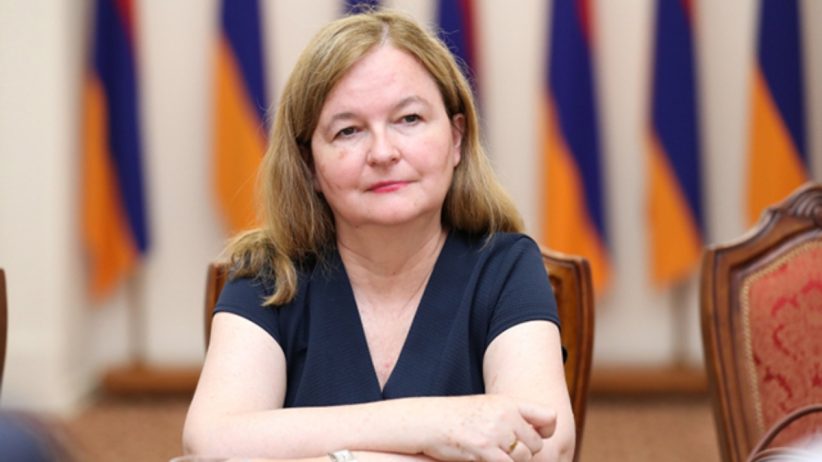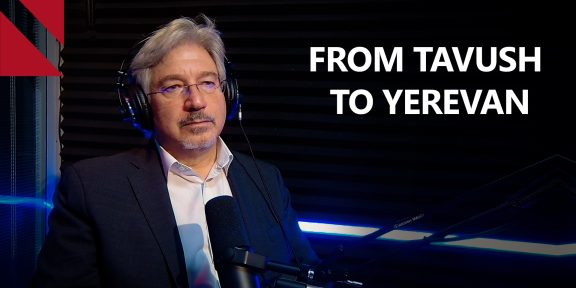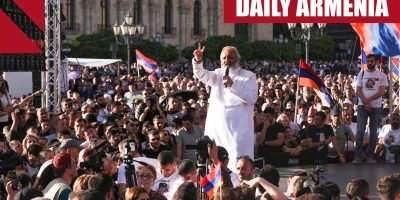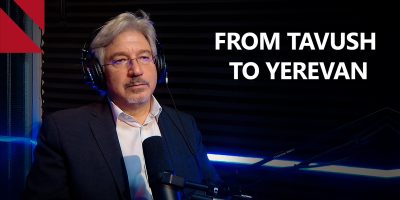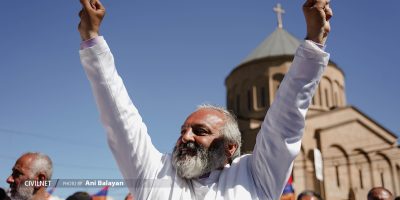By Emilio Luciano Cricchio
Natalie Loiseau, a French member of the European Parliament and former Minister of European Affairs, spoke to CivilNet about the EU’s decision last month to deploy a civilian mission to the Armenian side of the Armenia-Azerbaijan border for two years. Loiseau also discussed France’s role in the EU mission and the peace process in general.
– The European Parliament adopted a resolution that did not only call for the Lachin corridor to be reopened, but also for international organizations to have access to Nagorno-Karabakh, including for OSCE or EU fact-finding missions. The International Crisis Group published a report last week mentioning that you and your colleagues would have probably faced pushback: Some in the EU want to maintain focus on Ukraine, while others worry that such resolutions could jeopardize key energy deals with Azerbaijan. Can you tell us about what it took to get this resolution adopted?
– Our resolution was widely supported and adopted by the European Parliament, showing a strong consensus to condemn the blockade exercised by Azerbaijan against the Armenian population of Nagorno-Karabakh in the Lachin corridor. We came with facts and a clear analysis of what was going on: For too long, only the International Committee of the Red Cross has been able to reach Nagorno-Karabakh. We would expect to see UN agencies present, especially now. For too long, the EU has kept its distance from the conflict. Now that a humanitarian crisis is underway, and Russia isn’t providing sufficient protection to the population of Nagorno-Karabakh, the EU and OSCE should do more.
– The resolution also included a condemnation of the Russian peacekeepers’ apparent inaction. Of course, the EU has taken a very definite line with regard to Russia’s full-scale invasion of Ukraine last February, and relations are at an all-time low. That all said, would you say there is an understanding in Brussels that Armenia is worried that deteriorated EU-Russia relations could have an adverse effect for the Armenian population of Nagorno-Karabakh – and potentially result in security risks for them?
– Once again, we look at facts and listen to statements. The facts are that, despite the presence of Russian “peacekeepers,” the blockade has been ongoing for more than 50 days. If Moscow wanted to stop it, it would have stopped it already. It was Russia that made commitments on November 9, 2020, regarding Nagorno-Karabakh and traffic in the Lachin corridor, not the EU. I would like to remind you that this commitment was recognized by the EU and mentioned during the quadrilateral meeting in Prague last October. Russia’s inaction doesn’t hurt the EU. It hurts the Armenian people. We hear (Russian Foreign Minister) Sergey Lavrov expressing skepticism toward efforts deployed by the EU between Armenia and Azerbaijan. But we also hear him taking sides with Azerbaijan regarding Nagorno-Karabakh. With friends like these, who needs foes?
– Apart from EU-Armenia relations, your native France has been very vocal about the security challenges Armenia is facing. The French National Assembly has also been supportive of Armenia and Artsakh. Would you like to see France, a co-chair to the OSCE Minsk Group, the traditional negotiating format between Armenia and Azerbaijan, put even more effort, resources and time to mediate between the sides?
– You are right to underline that France is the most active country when it comes to caring about Armenia. The question is: What is the best format to mediate between Azerbaijan and Armenia ? To tell you the truth, I am agnostic. No matter if a cat is black or white, as long as it catches mice. I don’t see much dynamism in the Minsk Group co-chairs format at the moment, probably due to Russia’s growing isolation. I welcome progress made in the quadrilateral meeting in Prague last October between Azerbaijan’s president, Armenia’s prime minister, the president of the European Council and French President Emmanuel Macron, with strong French input. This was when a mission at the border between Armenia and Azerbaijan was agreed upon. It is now broadened and prolonged, and I think that is a very positive development. This makes me think that this quadrilateral format is appropriate.
– The EU’s resolution, French National Assembly President Braun-Pivet’s visit, numerous phone calls by European leaders. They are all calling for the blockade of Nagorno-Karabakh to be lifted. Despite this, Azerbaijani President Ilham Aliyev said in January, during an interview on state TV that, as he put it, he just takes these calls out of courtesy. Doubtless, these statements and resolutions are important and very much appreciated by Armenia. But there are worries that statements and resolutions are not having an effect. Is there anything additional you would like to see done to pressure Baku to lift the blockade?
– My first reaction would be to insist that there can be no negotiations as long as the Lachin corridor is still blocked. I would also like to see a fact-finding mission swiftly sent to the corridor. This would be the role of the UN Security Council to go, see and raise its voice. Then one shouldn’t abandon the prospect of a resolution in the UN Security Council.
– A very important decision was made by the European Union to deploy a mission to Armenia’s border areas. The hope is that their presence will avert any attack in the future by Azerbaijan on Armenia. An earlier civilian mission to the Armenian side of the border lasted from October to December of last year. Could you speak a bit about the French perspective on and contribution to this mission?
– I strongly support this new mission, broader in scope and size. I am glad that France announced it would provide eight gendarmes to the mission. It will be operational beginning on February 20, and I will be present in Armenia on that date. I welcome Armenia’s support for and cooperation with the mission. It will be our eyes and ears on the ground, and its presence should deter new attacks. I can only hope that Azerbaijan engages with the mission in good faith.
– The EU runs a similar mission in Georgia. That mission was first deployed in 2008, but is still on the ground today, prompting analysts to speculate if the Armenia mission may last longer than the planned two years. Is it plausible that the mission could stay longer for two years?
– I hope that a sustainable peace can be achieved between Azerbaijan and Armenia in less than two years. Let’s make our best efforts to go in this direction.
– Two years will take us close to 2025, when the current mandate of the Russian peacekeeping contingent in Karabakh is set to expire. Aliyev has already said repeatedly that the peacekeepers must leave in 2025. The International Crisis Group report I referred to earlier gave several recommendations on how to avert a new escalation between Armenia and Azerbaijan. One recommendation was to create a mechanism of communication between the EU mission, the Russian peacekeeping contingent in Karabakh and the Russian border guards in Armenia. It’s quite interesting in the current geopolitical environment that Russians and Europeans will be deployed to the same region. Armenia wants the two forces to peacefully coexist. Can this be accomplished?
– It is not up to me to decide who the EU mission will talk to. What is clear is that the EU is in Armenia to improve confidence, stability and security and therefore will be open to talk to all stakeholders of goodwill.




